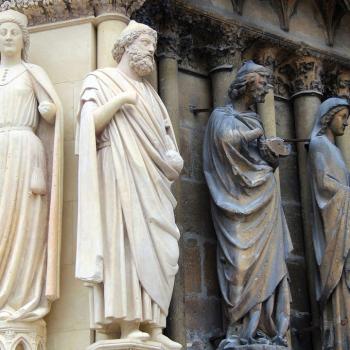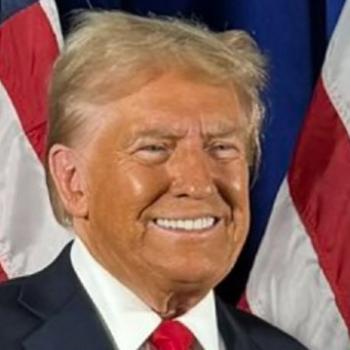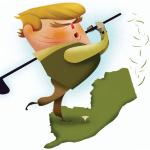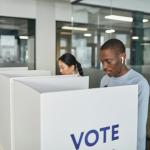The Saddam verdict and sentence aren't a surprise. The former dictator's crimes were not a secret, but a source of sick pride. He ordered the death of more than a hundred villagers to make an example out of them — so at the time he carried out the slaughter with as much attention-grabbing publicity as he could muster.
And it's not like he was claiming innocence (When? I was out of town then — and Mrs. Saddam and I went to bed early …). Saddam's defense, rather, was that he had the right to do what he did because he was the president, dammit, and it can't be illegal if the president does it.
That's how Saddam thought and apparently how he still thinks. He still can't wrap his mind around the idea that he should be forced to stand trial accused of violating the law. He thinks he is the law, or at least that he was the law. He was the law because he was the strongest, and whoever is the strongest makes the rules. The closest he can come to understanding what's happening to him now, then, is thinking that a new strongman has taken charge and that his trial, conviction and sentence are simply a function of that new strongman setting his own new, arbitrary rules. The idea that his conviction is due to his having broken laws that exist outside of and above the whim of any particular strongman — the idea, in other words, of the rule of law — still seems beyond Saddam's grasp.
It's a shame if this reading of the man is true, because it means he is still able to think of himself as something other than what he really is: a criminal. I'd prefer that, before his execution, he could be made aware of this, that this is all he is — a criminal and a murderer who got caught. Instead, it seems, he will go to his death thinking of himself only as a powerful man who lost a struggle for power, but who did nothing wrong because right and wrong don't apply to powerful men. It can't be wrong if the president does it, he thought, and still thinks.
All of which is why I doubt George W. Bush is 100-percent happy to see this verdict and sentence. Yes, apparently, the announcement of this verdict was rushed in the hopes of influencing tomorrow's U.S. election (the verdict won't actually be ready until Thursday, but they made sure to announce it before the vote anyway), but I still think this verdict likely makes George W. Bush a little bit nervous.
President Bush has argued — often and explicitly — that, as president, he is not subject to the rule of law, that it can't be illegal if the president does it. This is the explanation his lawyers, Alberto Gonzales and John Yoo, have repeatedly given for why no American law or treaty can limit the president's options by forbidding warrantless wiretapping or, God help us, even torture. This is the rationale for the 600 or so "signing statements" in which President Bush has repeatedly claimed, even while signing into law legislation that governs everyone else, that he is personally, officially and regally exempt from their authority.
My point here is not simply that Bush is wrong to declare himself and his office above the law (although he is wrong). My point here is that if you think as Mr. Bush thinks, then you cannot afford — ever — to allow power to leave your hands. Allow that to happen and you could very well find yourself, like Saddam, standing in the dock and being called to account for violating the law you had declared yourself exempt from. Which means you need to be prepared to do whatever it takes to prevent that from happening.
So Bush is bound to be a little nervous watching what happens when someone formerly supposed to be above the law finds himself caught beneath it. And I am, in turn, a little nervous to consider what might result from Bush's nervousness. Articles like this one, for instance, "Rove Sees No GOP Fall in the 2006 Election," are worrisome:
Karl Rove, President Bush's top political strategist, says he doesn't believe the polls — at least the public polls that claim the Republicans are likely to lose the House of Representatives and possibly even the Senate on Election Day. …
I realize, as Media Matters points out, that it's Rove's job to project such optimism. But it still makes me nervous.
NPR's Ron Elving says this nervousness comes from Rove's electoral successes, such as in the 2004 election, in which John Kerry swept the presidential debates and went into election day with a substantial lead in the polls. Exit polling confirmed those pre-election polls, but then — wow! look at that! — the actual counting of ballots showed something different and Rove wins again.
Elving credits this to Rove's tactical genius:
Relying on sophisticated, computerized voter-targeting and swarms of contact people working the final 72 hours of the campaign, Rove's machine can erase multiple points of polling margin in important races. It costs millions, but Rove raises money with the best of them — including powerful officeholders.
And that Official Story, Elving is confident, explains why George W. Bush, trailing in the polls, saw a sudden spike in his popularity on Election Day 2004. The spike was short-lived — Bush's approval numbers quickly fell, again, below 50 percent and have stayed there ever since. But that hardly matters because Rove's "sophisticated, computerized" 72-hour campaign was able to engineer this one-day spike in Bush's otherwise undetectable popularity, and that was enough for victory. That is the Official Story and, as such, is not subject to the need for substantiation.
When University of Pennsylvania statistician Dr. Steven F. Freeman examined the Unexplained Exit Poll Discrepancy" [.pdf] in the 2004 election, he calculated that the odds against so many polls being so very wrong in precisely the same way were about 250,000,000 to 1.
Elving sees nothing suspicious about Rove's amazing, 1-in-250 million election day miracle. It was simply the result of his "sophisticated, computerized voter-targeting and swarms of contact people working the final 72 hours." Anomaly explained. It certainly had nothing to do with this:
… He touched the screen for gubernatorial candidate Jim Davis, a Democrat, but the review screen repeatedly registered the Republican, Charlie Crist. …
Mauricio Raponi wanted to vote for Democrats across the board at the Lemon City Library in Miami on Thursday. But each time he hit the button next to the candidate, the Republican choice showed up. Raponi, 53, persevered until the machine worked. Then he alerted a poll worker.
Or with this:
KFDM continues to get complaints from Jefferson County [Texas] voters who say the electronic voting machines are not registering their votes correctly.
Friday night, KFDM reported about people who had cast straight Democratic ticket ballots, but the touch-screen machines indicated they had voted a straight Republican ticket.
Some of those voters including Lamar University professor, Dr. Bruce Drury, believe the problem is a programming error.
Saturday, KFDM spoke to another voter who says it's not just happening with straight ticket voting, he says it's happening on individual races as well, Jerry Stopher told us when he voted for a Democrat, the Republican's name was highlighted.
Stopher said, "There's something in these machines, in this equipment, that's showing Republican votes when you vote for Democrats, and I know Ms. Guidry's a nice lady, and she's working hard, but her theory that my fingernail was somehow over the Republican button is just unrealistic, my fingernail was not. The equipment is not working properly as far as I can tell."
(Both links via The Sideshow.)
To draw any connection between such stories and Rove's extreme confidence that pre-election polling is, once again, inaccurate would be an example of what Elving calls, "darker scenarios … bruited about on talk shows and blogs." You know, the kind of wacky conspiracy thinking that worries about machines that flip votes, always in one direction, and that worries about massive, inexplicable discrepancies in exit polling, and that worries about the glib complacency of NPR analysts who would be happy, if every pre-election and post-election poll were again found to be mistaken, to attribute it all to the godlike powers of Rove's 72-hour, sophisticated, computerized genius.
Journalists like Elving seem to think of Karl Rove as an electoral Chuck Norris. Karl Rove can divide by zero. Karl Rove counted to infinity — twice. Karl Rove can slam a revolving door. Karl Rove can make a rock so big he can't lift it … and then he could lift it.
So if Rove delivers another miraculous Roundhouse Kick on Election Day, such journalists won't be surprised. "Wow," they'll say, "that Karl Rove is really something! None of the polls predicted the GOP would maintain control of the House, but I guess those polls didn't account for the sophisticated, computerized genius of Rove Fu. Please go back to sleep, and dream pleasant dreams of democracy."
Here's hoping that the "darker scenarios" are as off-base as Elving seems to think and that we won't spend tomorrow evening, yet again, watching the pundits flail about for some new narrative — butterfly ballots! evangelical stealth voters! maybe the nation's fingernail accidentally hit a GOP button … — to provide an excuse for yet another set of unexplained exit poll discrepancies.
















